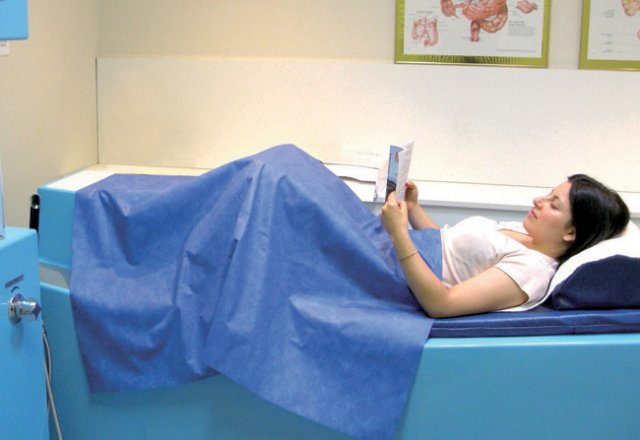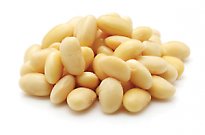
Colon cleansing: does it really work?

We put it to the test!
Colon cleansing – also known as colonic irrigation– has some natural health experts divided. So, we put it to the test... and were pretty impressed with the results.
When I first arrived at Colon Irrigation Melbourne, I was a little nervous – as I’m sure most are prior to their first colonic irrigation. I was greeted at reception by two ladies, one of who was Edna Granot, director of Colon Irrigation Melbourne. If I needed proof of the potential health benefits of regular colonics, Granot is it. Not only does she look decades younger than her 61 years, she has the energy and vitality of a 20-year-old. She also has a manner so friendly and matter-of-fact (not to mention a passion for her trade) that all anxiety felt prior to the procedure was quickly forgotten.
According to the International Association for Colon Hydrotherapy (I-ACT), ‘[Colonic irrigation, also known as colonic hydrotherapy] is a safe, effective method of removing waste from the large intestine, without the use of drugs. By introducing pure, filtered and temperature-regulated water into the colon, human waste is softened and loosened, resulting in evacuation through natural peristalsis.’
The procedure removes faecal material from the colon walls and dilutes the bacterial toxic concentration in the large intestine. The primary physical goals of each session are to hydrate the system, remove waste, stimulate peristalsis, rehabilitate the nerves, muscles, glands, circulatory and immune systems that form the components of the digestive system, and to reposition the intestines. Benefits of a session can include renewed energy and vitality, healthy and natural weight loss, detoxification, a clearer complexion and relief from bloating and constipation.
As well as the standard water irrigation, Colon Irrigation Melbourne offers two types of colonic: herbal irrigation and coffee irrigation.
HERBAL IRRIGATION
“Herbal irrigations at Colon Irrigation Melbourne have been specially designed to stimulate the detoxifying organs of the body, particularly the liver, skin and kidneys,” says Granot. “Herbal irrigations stimulate peristaltic activity of the colon and help loosen blockages and deposits in the colon. The herbal preparations, which are ideal for gas, yeast overgrowth and candida, are stabilised in a colloidal mineral base with a high magnesium base, which draws fat out of the liver and restores healthy bacteria in the colon. This soothes the bowel in restoring natural functions of the colon.”
COFFEE IRRIGATION
“Coffee colonics rapidly help remove toxins from the liver. They often provide quick relief when one is fatigued, sleepy, has headaches, or is just feeling poorly. They also help against spasms, pericardial (heart, throat, chest) pain and difficulties resulting from the sudden withdrawal of all intoxicating sedation. When administered correctly, a coffee colonic causes the liver to produce more bile, opens the bile ducts and causes the bile to flow. In this process, a toxic liver can dump many of its toxins into the bile and get rid of them in just a few minutes. This often gives great relief to all parts of the body, resulting in a feeling of increased energy and vitality. Coffee colonics are also effective in relieving pain. Patients with cancer, for example, may achieve relief from pain even when drugs have failed.”
THE TECHNIQUE
It is recommended that no food is consumed two hours prior to a session; however, plenty of water or raw vegetable juice is advised as both are good for hydrating and softening faecel matter, which assists in the removal of waste from the colon.
Following a brief consultation (which involves some handy nutritional and lifestyle advice – Granot is also a post-grad in nutritional and environmental medicine), Granot led me to my private room – complete with toilet, fan, soothing music and rack of books and magazines. She gave me a quick rundown, including instructions on how to mount the table – which looks a little like a large plastic massage table, complete with leg and foot rests and a basin in the centre – and asked me to swallow a probiotic and electrolyte drink.
Granot removed a thin plastic tube, no thicker than a straw and about six-to-eight inches in length, from sealed packaging and placed it above the basin. She then handed me a rubber glove and a sachet of lubrication and told me what to do. She left the room, leaving me to undress and follow her instructions.
Once I was aboard, I covered myself with the disposable blanket and pressed the buzzer beside the bed. Granot returned, turned on the gentle flow of lukewarm water and left the room.
It is recommended that following the first session, clients have a second within 24 hours. This is because the first session softens and loosens compacted waste that may have been in the colon for a number of years and the second session, 20 or so hours later, rinses it all out. The third session five or six days later gives the colon a thorough clean.
THE EXPERIENCE
It was perfectly comfortable and very private. It wasn’t painful, although at times I did experience waves of mild nausea. Granot advised me that this was due to toxins leaving my body.
After the first session, I felt pretty good; after the second and third, I felt fantastic. My tummy was flatter than it has been in years and my skin began to glow two or three days after.
ABOUT THE PRACTITIONER
“My initial training was in Texas, USA from a wonderful teacher and after my exams, I became a member of I-ACT (International Association for Colon Hydrotherapy),” says Granot. “My definition of wellbeing is having a healthy mind and body,” she says. “As a colon irrigation and massage therapist, I have helped hundreds of clients reach their goal of a healthier, more vibrant body. However, developing and improving the mind and spirit is equally as important. Over the last five years, I have been actively involved with many charities and not-for-profit organisations, which have empowered me to be a more loving and giving individual to both my family and my clients.”
In July 2007, at the age of 58, Granot donated a kidney to her son. “This was his third kidney transplant and so far has been his most successful. The decision to have the operation was one of the best things I ever did in my life. My son is happy and healthy and can look forward to his future and a whole new life.” In order to prove Granot’s health and strength following the donation, she insisted on giving me a one-hour massage. I can wholeheartedly concur that donating a kidney does not leave the donator weak or their health compromised… Granot gave me one of the firmest massages I have ever experienced! If you are interested in becoming an organ donor please visit: www.transplant.org.au
NEED TO KNOW
Cost: A recommended course of three standard colonic irrigations is $180.


